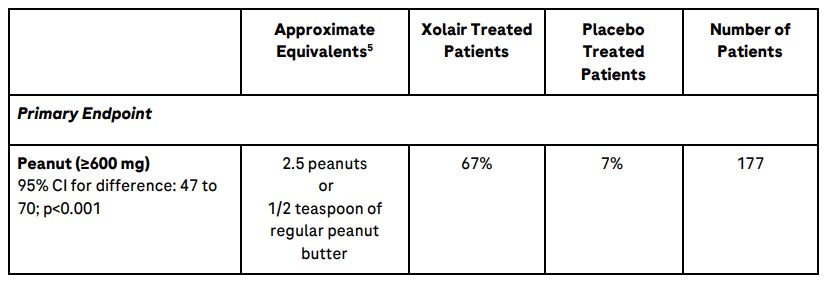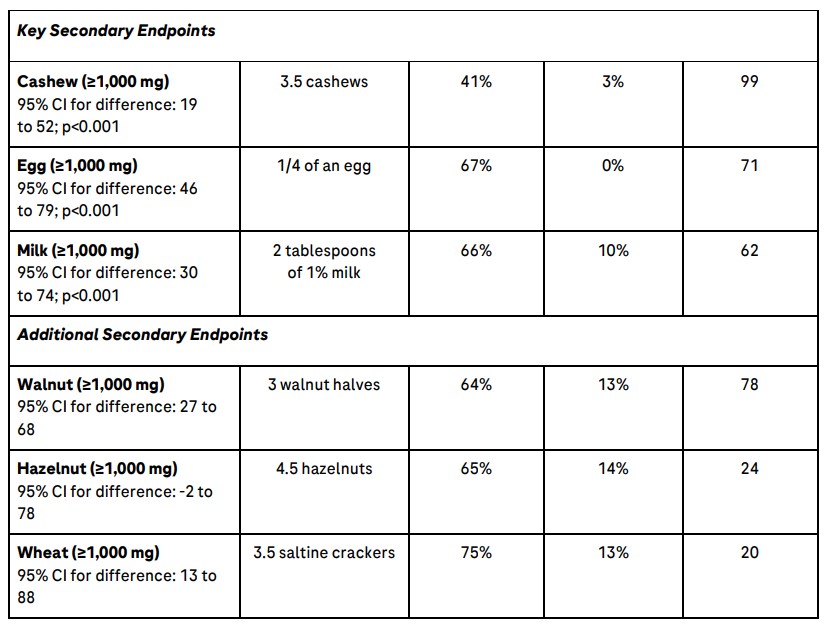
Detailed results from the NIH-sponsored Phase III OUtMATCH study showed treatment with Xolair increased the amount of peanuts, tree nuts, egg, milk and wheat that people as young as 1 year consumed without an allergic reaction
The U.S. FDA recently approved Xolair as the first and only medicine for children and adults with one or more food allergies
Allergic reactions can be life-threatening and it is estimated that food-related anaphylaxis results in 30,000 medical events treated in emergency rooms in the U.S. each year
Basel, 25 February 2024 - Roche (SIX: RO, ROG; OTCQX: RHHBY) announced today data from Stage 1 of the National Institutes of Health (NIH)-sponsored pivotal Phase III OUtMATCH study evaluating the efficacy and safety of Xolair® (omalizumab) in patients allergic to peanuts and at least two other common foods were published in the New England Journal of Medicine (NEJM) and featured in a late-breaking symposium at the 2024 American Academy of Allergy, Asthma & Immunology (AAAAI) Annual Meeting. The study showed treatment with Xolair increased the amount of peanuts, milk, egg, wheat and tree nuts (cashew, hazelnut and walnut) that it took to cause moderate to severe allergic reactions in multi-food allergic people as young as 1 year. Safety findings were consistent with the known safety profile of Xolair across its approved indications and in previous clinical trials.4 The U.S. Food and Drug Administration (FDA) recently approved the expanded use of Xolair in children and adults with IgE-mediated food allergies based on the OUtMATCH data.
“Over the past 35 years, I have seen how debilitating food allergies can be for patients and their loved ones, as they are consumed by the fear of accidental exposure,” said Robert Wood, M.D., director of the Eudowood Division of Allergy, Immunology and Rheumatology at Johns Hopkins Children's Center, and principal investigator of the OUtMATCH study. “While allergic reactions to exposures are common and often severe, there have been limited treatment advancements for food allergy. The results of the OUtMATCH study showed that anti-IgE therapy could significantly reduce the occurrence of allergic reactions across multiple foods in the event of an accidental exposure.”
“Living with food allergies has a profound impact on patients and their families, causing significant stress and requiring constant vigilance,” said R. Sharon Chinthrajah, M.D., associate professor of medicine, Stanford School of Medicine, Sean N. Parker Center for Allergy and Asthma Research and OUtMATCH co-lead study investigator. “The OUtMATCH study demonstrated that anti-IgE therapy increased most patients’ threshold for an allergic reaction. This presents an important new treatment option for patients and families in its potential to reduce the risk of allergic reactions from accidental exposures they may face in day-to-day life.”
One hundred eighty patients ages 1 to 55 years old entered Stage 1 of the OUtMATCH study unable to tolerate up to 100 mg of peanut protein (equivalent to about one third of a peanut), and up to 300 mg of at least two other food proteins among milk, egg, cashew, walnut, hazelnut and wheat. After 16 to 20 weeks of treatment with Xolair or placebo, each participant completed four separate blinded food challenges (including a placebo ingredient) to assess patients’ ability to consume a single dose of at least 600 mg of peanut protein (primary endpoint), and a single dose of at least 1,000 mg of milk, egg, wheat, cashew, hazelnut or walnut protein (secondary endpoints) without experiencing moderate to severe allergic reactions.
Results showed that, compared to placebo, a statistically significant (p<0.001) higher proportion of patients receiving Xolair were able to consume at least 600 mg of peanut protein and at least 1,000 mg of milk, egg and cashew protein without experiencing moderate to severe allergic reactions. Additionally, compared to placebo, a higher proportion of patients receiving Xolair were also able to consume at least 1,000 mg of walnut, hazelnut and wheat protein without experiencing moderate to severe allergic reactions. Detailed results are included in the table below.
OUtMATCH Primary and Secondary Endpoints Results in Paediatric Population (n=177)
Percentage of Patients Successfully Consuming Predefined Threshold Dose of Seven Foods


Additionally, out of three adult OUtMATCH participants, two completed Stage 1 of the study; the adult who received Xolair met the primary endpoint compared to the placebo-enrolled adult patient.
Adverse event rates in the study were similar between Xolair and placebo. The most common adverse event in Xolair-treated children and adolescents was injection site reaction (9%).
“The Phase III OUtMATCH results represent a major advance and reinforce our commitment to addressing critical gaps in care for conditions like food allergy,” said Levi Garraway, M.D., Ph.D., Roche’s Chief Medical Officer and Head of Global Product Development. “Now recently FDA-approved, Xolair provides a new way to help manage food allergies for children and adults who live with the constant fear of life-threatening allergic reactions.”
While efficacy cannot be established from uncontrolled, open-label studies, for 38 children who continued Xolair for 24-28 weeks in an open-label extension, the percentage of patients who were able to consume 600 mg or more of peanut protein and 1,000 mg or more of egg, milk and/or cashew protein without moderate to severe dose-limiting symptoms was maintained.
About 3.4 million children and 13.6 million adults in the U.S. will have been diagnosed with IgE-mediated food allergies, based on estimates for 2024.1,2 Food allergy prevalence has been on the rise for the past 20 years.6 There are 160 different foods that cause IgE-mediated food allergy.7 Allergic reactions can range from mild to moderate, including hives and swelling, to severe and life-threatening, such as anaphylaxis.3 More than 40% of children and more than half of adults with food allergies have experienced a severe reaction at least once, and it is estimated that food-related anaphylaxis results in 30,000 medical events treated in emergency rooms in the U.S. each year.1-3
On 16 February, 2024, the FDA approved Xolair for the reduction of allergic reactions, including anaphylaxis, that may occur with accidental exposure to one or more foods in adult and paediatric patients aged 1 year and older with IgE-mediated food allergy. People taking Xolair for food allergies should continue to avoid all foods they are allergic to (commonly referred to as “food allergen avoidance”). Xolair should not be used for the emergency treatment of any allergic reactions, including anaphylaxis. Xolair is the first and only FDA-approved medicine to reduce allergic reactions in people with one or more food allergies.
In the U.S., Genentech, a member of the Roche Group, and Novartis Pharmaceuticals Corporation work together to develop and co-promote Xolair.
AAbout the OUtMATCH Study
The Omalizumab as Monotherapy and as Adjunct Therapy to Multi-Allergen Oral Immunotherapy in Food Allergic Children and Adults (OUtMATCH; NCT03881696) study is an NIH-sponsored, three-stage, multicentre, randomised, double-blind, placebo-controlled study evaluating Xolair safety and efficacy in patients aged 1 to 55 years who are allergic to peanuts and at least two other common foods.
Stage 1 included 180 patients (177 children and adolescents; 3 adults) who were randomly assigned to receive placebo or Xolair injections either every two weeks or every four weeks for 16 to 20 weeks. The Xolair dose and dosing interval were determined by total serum IgE level and body weight at baseline.
After 16 to 20 weeks of treatment with Xolair or placebo, each participant completed four separate blinded food challenges where they were given gradually increasing amounts of peanut protein, two other food proteins they were allergic to, and a placebo ingredient. The food challenges were conducted in a carefully controlled setting with investigators looking for signs and symptoms of allergic reaction to assess patients’ ability to consume a single dose of at least 600 mg of peanut protein (primary endpoint), and a single dose of at least 1,000 mg of milk, egg, wheat, cashew, hazelnut or walnut protein (secondary endpoints) without experiencing dose-limiting symptoms, which were defined as moderate to severe allergic reactions, including skin, respiratory or gastrointestinal symptoms.
The OUtMATCH study is being sponsored and funded by the National Institute of Allergy and Infectious Diseases (NIAID), part of the NIH, and conducted by the NIAID-funded Consortium for Food Allergy Research (CoFAR) at 10 clinical sites across the U.S. led by Johns Hopkins Children's Center and co-led by Stanford School of Medicine. The study is also supported by Genentech and Novartis Pharmaceuticals Corporation.
About Xolair
Xolair is the only approved antibody designed to target and block immunoglobulin E (IgE). By reducing free IgE, down-regulating high-affinity IgE receptors and limiting mast cell degranulation, Xolair minimises the release of mediators throughout the allergic inflammatory cascade.
About Roche in Immunology
The Roche Group’s immunology medicines include: Actemra®/RoActemra® (tocilizumab) for rheumatoid arthritis, polyarticular juvenile idiopathic arthritis (pJIA), systemic juvenile idiopathic arthritis (sJIA) and giant cell arteritis (GCA) and for the treatment of severe or life-threatening chimeric antigen receptor (CAR) T cell-induced cytokine release syndrome (CRS); Rituxan®/MabThera® (rituximab) for rheumatoid arthritis granulomatosis with polyangiitis and microscopic polyangiitis and for pemphigus vulgaris (PV); Xolair® (omalizumab) for allergic asthma and chronic idiopathic urticaria (CIU); Pulmozyme® (dornase alfa) for cystic fibrosis; and Esbriet® (pirfenidone) for idiopathic pulmonary fibrosis (IPF). Roche has more than 15 investigational medicines in clinical development for immunological diseases that include asthma, autoimmune diseases, rheumatoid arthritis, ulcerative colitis and Crohn's disease.
About Roche
Roche is a global pioneer in pharmaceuticals and diagnostics focused on advancing science to improve people’s lives. The combined strengths of pharmaceuticals and diagnostics under one roof have made Roche the leader in personalised healthcare – a strategy that aims to fit the right treatment to each patient in the best way possible.
Roche is the world’s largest biotech company, with truly differentiated medicines in oncology, immunology, infectious diseases, ophthalmology and diseases of the central nervous system. Roche is also the world leader in in vitro diagnostics and tissue-based cancer diagnostics, and a frontrunner in diabetes management.
Founded in 1896, Roche continues to search for better ways to prevent, diagnose and treat diseases and make a sustainable contribution to society. The company also aims to improve patient access to medical innovations by working with all relevant stakeholders. More than thirty medicines developed by Roche are included in the World Health Organization Model Lists of Essential Medicines, among them life-saving antibiotics, antimalarials and cancer medicines. Moreover, for the twelfth consecutive year, Roche has been recognised as one of the most sustainable companies in the Pharmaceuticals Industry by the Dow Jones Sustainability Indices (DJSI).
The Roche Group, headquartered in Basel, Switzerland, is active in over 100 countries and in 2020 employed more than 100,000 people worldwide. In 2020, Roche invested CHF 12.2 billion in R&D and posted sales of CHF 58.3 billion. Genentech, in the United States, is a wholly owned member of the Roche Group. Roche is the majority shareholder in Chugai Pharmaceutical, Japan